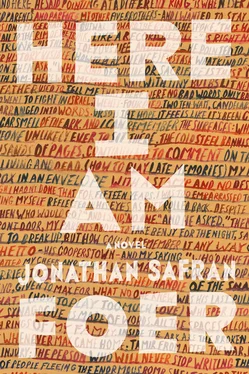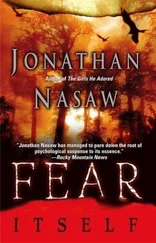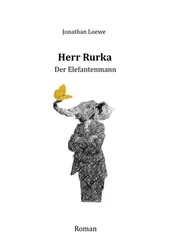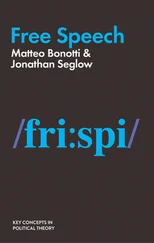“I’m not good at life.”
“You are when you’re thoughtful.”
“Is Dad bad at life?”
It went almost perfectly, but movers are less almost-perfect than the rest of humankind, and there were mishaps, hardly any of them noticeable — who but Sam would know that a Jewish star was dinged and hung upside down? — especially when hardly any of it was noticed in the first place. The tiny distance from perfect rendered it shit.
Sam’s dad had given him an article about a boy in a concentration camp who observed his bar mitzvah by digging an imaginary synagogue and filling it with upright twigs to serve as a silent congregation. Of course, his dad never would have guessed that Sam actually read it, and they never spoke about it, and does it count as recalling something if you are thinking of it constantly?
It was all for the occasion — the entire edifice of organized religion conceived of, built, and tended to simply for a brief ritual. Despite the incomprehensible vastness of Other Life, there was no synagogue. And despite his profound reluctance ever to step foot in an actual synagogue, there had to be a synagogue. He didn’t long for one, he needed one: you can’t destroy what doesn’t exist.
All happy mornings resemble one another, as do all unhappy mornings, and that’s at the bottom of what makes them so deeply unhappy: the feeling that this unhappiness has happened before, that efforts to avoid it will at best reinforce it, and probably even exacerbate it, that the universe is, for whatever inconceivable, unnecessary, and unjust reason, conspiring against the innocent sequence of clothes, breakfast, teeth and egregious cowlicks, backpacks, shoes, jackets, goodbye.
Jacob had insisted that Julia take her car to the meeting with Rabbi Singer so she could leave straight from there and still get her day off. The walk through the school to the parking lot was severely quiet. Sam had never heard of Miranda rights, but he intuited them. Not that it mattered — his parents didn’t want to talk in front of him before talking behind his back. So they left him at the entrance, among the mustached man-children playing Yu-Gi-Oh! while they went to their cars.
“Did you want me to pick anything up?” Jacob asked.
“When?”
“Now.”
“You have to get home for brunch with your parents.”
“I’m just trying to take some load off your shoulders.”
“We could use sandwich bread.”
“Any particular kind?”
“The particular kind we always get.”
“What?”
“What what?”
“You seem bothered.”
“You aren’t bothered?”
Had she found the phone?
“We’re not going to talk about what just happened in there?”
She hadn’t found the phone.
“Of course we are,” he said. “But not in this parking lot. Not with Sam waiting on the steps for us and my parents waiting at the house.”
“So when?”
“Tonight?”
“Tonight? With a question mark? Or, tonight .”
“Tonight.”
“You promise?”
“Julia.”
“And don’t just let him sulk in his room with his iPad. He should know we’re upset.”
“He knows.”
“Yes, but I want him to know even when I’m not there.”
“He’ll know .”
“You promise?” she asked, this time letting the question descend rather than rise.
“Cross my heart and hope against hope to die.”
She could have said more — given examples from recent history, or explained why it wasn’t the punishment she was worried about, but the reinforcement of their nearly calcified and completely miscast parental roles — but chose instead to offer a gentle, sustained squeeze of the arm.
“I’ll see you this afternoon.”
Touch had always saved them in the past. No matter the anger or hurt, no matter the depth of the aloneness, a touch, even a light and passing touch, reminded them of their long togetherness. A palm on a neck: it all flooded back. A head leaned upon a shoulder: the chemicals surged, the memory of love. At times, it was almost impossible to cross the distance between their bodies, to reach out. At times, it was impossible. Each knew the feeling so well, in the silence of a darkened bedroom, looking at the same ceiling: If I could open my fingers, my heart’s fingers could open. But I can’t. I want to reach across the distance, and I want to be reached. But I can’t.
“I’m sorry about this morning,” he said. “I wanted you to have the whole day.”
“You’re not the one who wrote those words.”
“Neither is Sam.”
“Jacob.”
“What?”
“It cannot, it will not, be the case that one of us believes him and one doesn’t.”
“So believe him.”
“He clearly did it.”
“Believe him anyway. We’re his parents.”
“That’s right. And we need to teach him that actions have consequences.”
“Believing him is more important,” Jacob said, the conversation happening too quickly for him to catch up to his own meaning. Why was he choosing this battle?
“No,” Julia said, “loving him is more important. And on the other side of punishment, he’ll know that our love, which requires causing him pain every now and then, is the ultimate consequence.”
Jacob opened Julia’s car door for her and said, “To be continued.”
“Yes, to be continued. But I need you to tell me we’re on the same page here.”
“That I don’t believe him?”
“That whatever you believe, you’re going to help me make clear that we are disappointed, and that he has to apologize.”
Jacob hated this. He hated Julia for forcing him to betray Sam, and he hated himself for not standing up to her. If there had been any hatred left, it would have been for Sam.
“OK,” he said.
“Yes?”
“Yes.”
“Thank you,” she said, getting into the car. “To be continued tonight.”
“OK,” he said, shutting the door. “And take as long as you want today.”
“What if as long as I want doesn’t fit in a day?”
“And I have that HBO meeting.”
“What meeting?”
“But not until seven. I mentioned it. You probably would’ve come back by then, anyway.”
“We’ll never know.”
“It’s annoying that it’s on a weekend, but it’ll only be an hour or two.”
“That’s fine.”
He gave her arm a squeeze and said, “Take what’s left.”
“What?”
“The day.”
* * *
The drive home was silent, save for NPR, whose omnipresence took on the character of silence. Jacob glanced at Sam in the rearview mirror.
“I went and done ate a can of your tuna fish, Ms. Daisy.”
“Are you having a stroke or something?”
“Movie reference. And might’ve been salmon.”
He knew he shouldn’t let Sam use his iPad in the backseat, but the poor kid had been through enough that morning. A little self-soothing seemed fair. And it deferred the conversation that he didn’t feel like having right then, or ever.
Jacob had planned on preparing an elaborate brunch, but when the call from Rabbi Singer came at nine fifteen, he asked his parents, Irv and Deborah, to come over early to watch Max and Benjy. Now there would be no ricotta-stuffed brioche french toast. There would be no lentil salad, no shaved brussels sprout salad. There would be calories.
“Two pieces of rye with creamy peanut butter, cut diagonally,” Jacob said, handing a plate to Benjy.
Max intercepted the food: “That’s actually mine.”
“Right,” Jacob said, handing a bowl to Benjy, “because you have Honey Nut Cheerios with a splash of rice milk.”
Читать дальше












